The John E. Marqusee Collection [51 - 100]
This page contains the second fifty medals listed in the John E. Marqusee Collection catalogue. The catalogue, authored by Susan Luftschein, is a wonderful resource for the American Art Medal collector and includes much beyond the simple list of medals. These pages simply attempt to provide a web-searchable repository for medals that are not all shown in the printed edition.
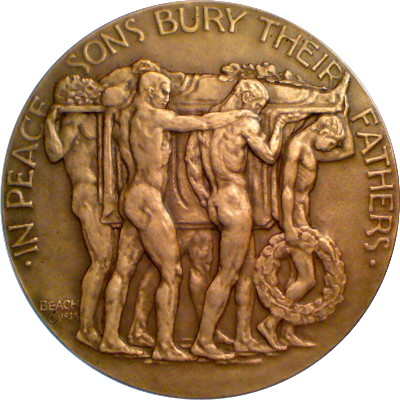
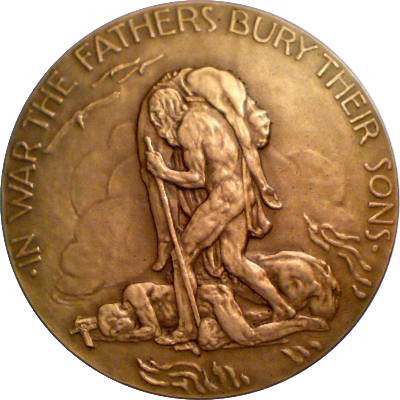
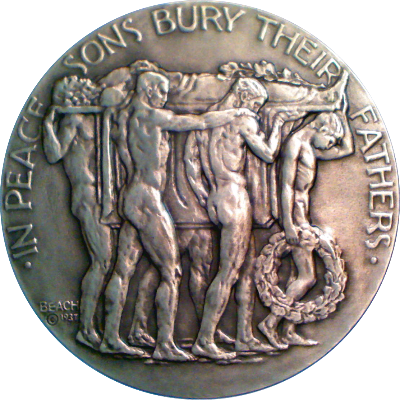
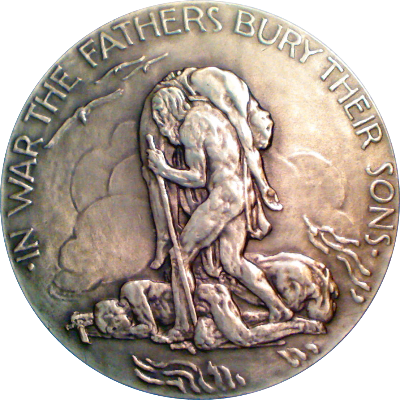
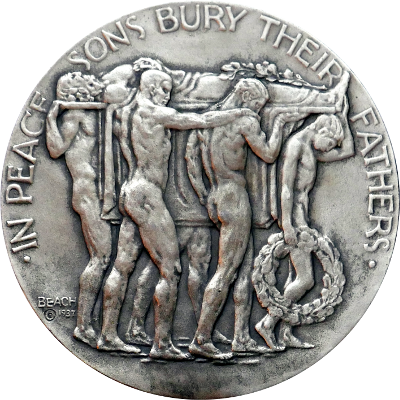
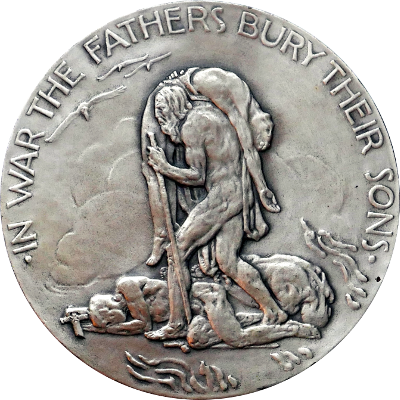
This medal was chosen as the 16th issue of the prestigious Society of Medalists series in 1937. The obverse bears five nude youths bearing father's bier. The youngest carries a laurel wreath. Around, IN PEACE SONS BURY THEIR FATHERS; at lower left, BEACH / © 1937. The reverse bears a gaunt father carrying son's body from the battlefield as vultures circle. Around, IN WAR THE FATHERS BURY THEIR SONS.
The brochure which acommpanied the medal had the following words from the artist:
"The tought of the medal is a simple, universal one when men pause to think straight; for that reason I have designed the medal as of no particular period. The Greeks probably put it most tersely, 'In Peace the Sons bury the Fathers, in War the Fathers bury the Sons.' Are our young men to be buried almost before mature manhood, under long rows of stone crosses, or are they to round out their lives and in turn be buried in reverence by their sons in peace? A thought to keep well before our vision as present war clouds again surround us."
Chester Beach put it well but what were the old men and the young men to do when young men far away were being led towards war by their leader?
Struck by the Medallic Art Company of New York, the reported production quantity of this medal is 941 in bronze and 100 in silver.
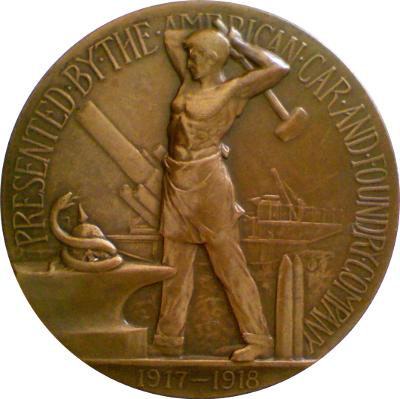
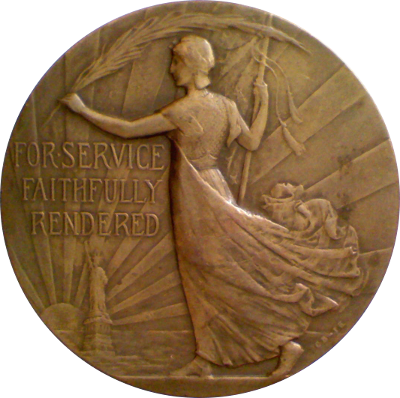
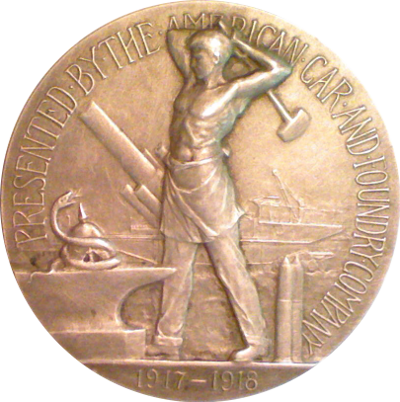
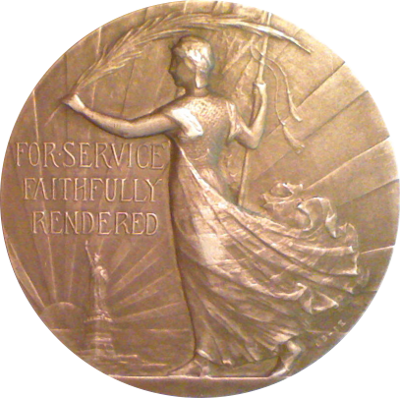
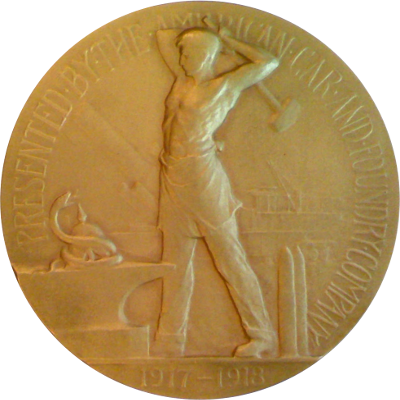
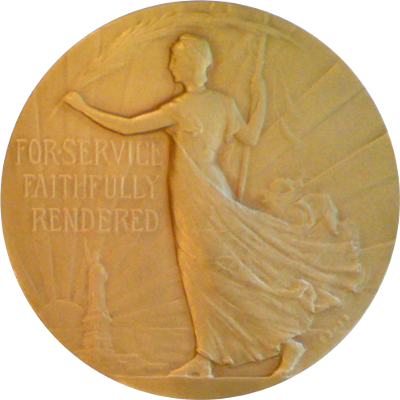
This medal's obverse bears worker about to strike snake on anvil with sledge hammer; howitzer in the background. Around, PRESENTED BY THE AMERICAN CAR AND FOUNDRY COMPANY; below, 1917-1918.
The reverse bears Columbia walking l. with palm frond; Statue of Liberty and sun in distance. On left, FOR SERVICE FAITHFULLY RENDERED; lower right, CB - JK.
The medal was presented to the company's employees for their faithful service during World War I. Accompanying the medal was a card containing the following message from William H. Woodlin, the President of the American Car and Foundry Company:
"The enclosed honor medal is awarded as an evidence of the appreciation by this Company of the work by you on its munition contracts, and as a lasting testimonial of the service rendered by you as an industrial soldier in the winning of the great war."
The signature CB - JK inidicates that the medal was a collaboration between Beach and Kilenyi (maybe design and sculpture) but I did not manage to find any evidence supporting the nature of their collaboration. Any additional evidence or a scan of the enclosed card would be appreciated.
This medal measures 63.5mm in diameter and was struck in bronze, silver, and 14k gold by the Gorham Manufacturing Company of Providence, RI. The silver is very rare and the gold exceedingly rare but the mintages are not reported.
References: Marqusee 52
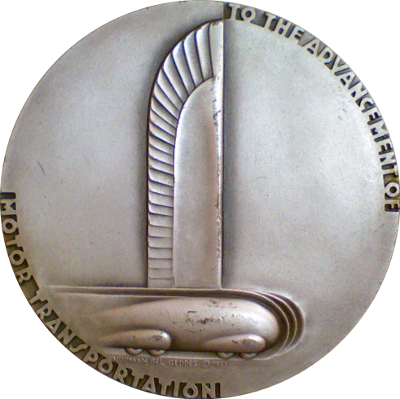
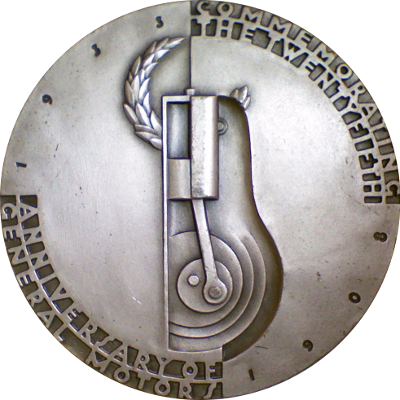
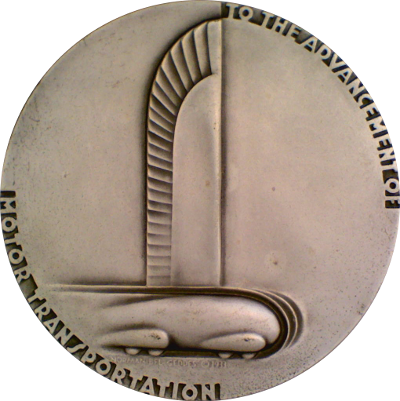
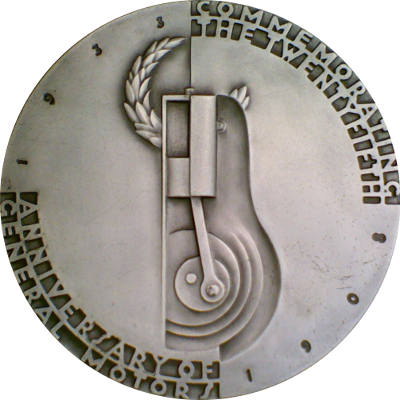
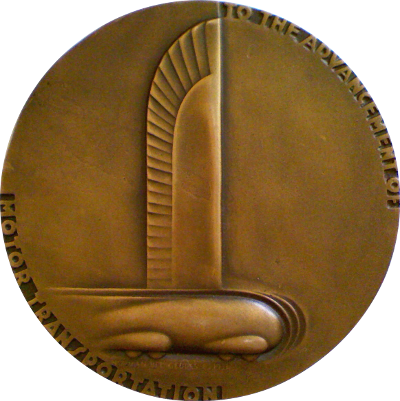
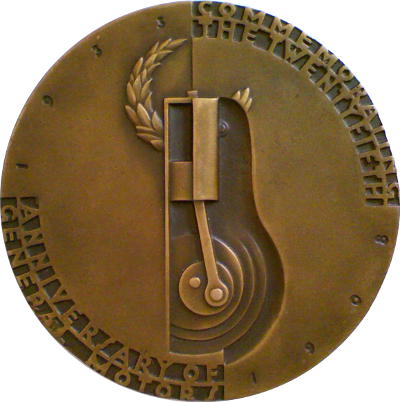
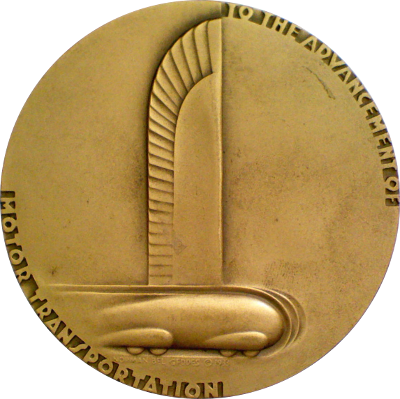
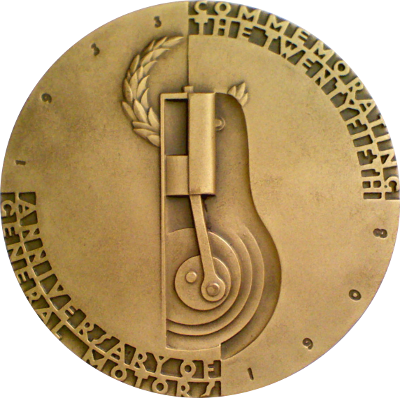
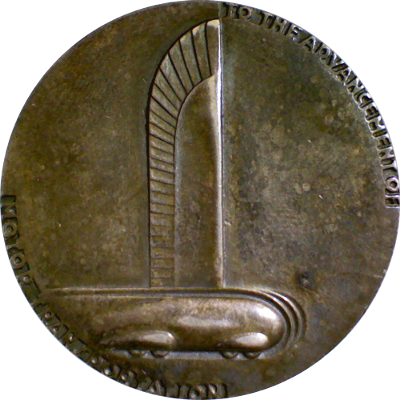
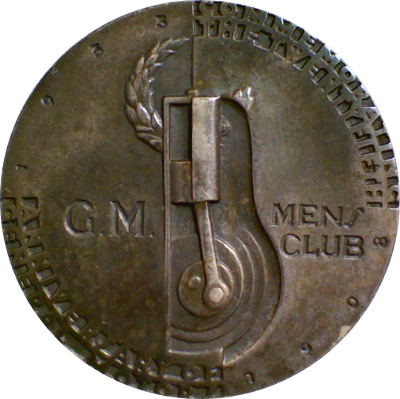
The obverse bears a streamlined car with stylized wing extending vertically up. Top right and bottom left, TO THE ADVANCEMENT OF - MOTOR TRANSPORTATION; signed under car, NORMAN BEL GEDDES © 1933. The reverse bears a stylized piston and laurels. Around in four quadrants, COMMEMORATING / THE TWENTYFIFTH - ANNIVERSARY OF / GENERAL MOTORS - 1908 - 1933.
This iconic machine-age medal is a perfect example of the Streamlined style that dominated architecture and design in America from the late 1920s to the end of the 1930s. It was designed by Norman Bel Geddes but sculpted by Rene Paul Chambellan. Its main variant was commissioned by General Motors to be distributed during its 25th Anniversary celebrations and at the 1933 Chicago World Fair of Progress.
The General Motors romance brochure that accompanied some medals included the following words about the design:
"The face of the medal shows a speeding automotive body behind which a wing rises perpendicularly. Since the medal is to be used as an award in future years and the car of the future is merely a guess, this car is an abstract streamline form without doors or windows. The conventionalized wing symbolizes General Motors interest in air transportation. The wing being static; the car, by contrast, seems to move more swiftly ... The reverse of the medal shows a combustion chamber ... since it is the heart of the motor. It too has been conventionalized."
The medal was manufactured in different variants. The relatively common ones measure 76mm in diameter and are struck in bronze or silver-plated bronze. The large silver-plated medal is the most common variant. The bronze and the smaller 38mm and 29mm variants are much less common. The smallest was inscribed across the reverse G.M. - MENS / CLUB and only given to GM executives. In the thirties it was of course a fairly safe bet that executive positions would be limited to men. A mounted plaque version measuring 9 inches in diameter was given to some dealers in the 1950s.
Completely intact silver-plated variants are hard to come by; the silver layer did not stand the test of time on most pieces and it is almost unheard of to see one without at least rubbing on high points.
Just as the design is unmistakably Bel Geddes, the execution is unmistakably Chambellan. Before I knew that it was a Bel Geddes, I would have guessed it to be a Chambellan based on its lettering alone.
The medal was struck by the Medallic Art Company of New York.
All that being said, prices for this medal vary even more widely based on quality and venue. Small antiques boutiques frequently offer the 76mm silver-plated pieces at prices over $2,000. Of course I do not know what prices are actually realized. On eBay, the 76mm medals frequently trade between $800 and $1,500 and I have not yet seen the smaller ones come up there.
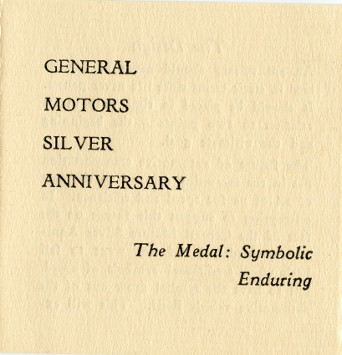
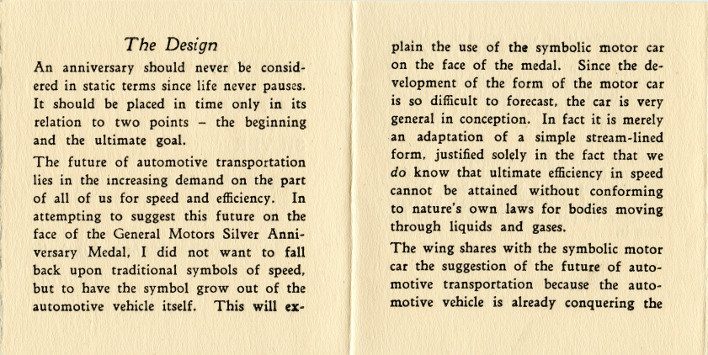
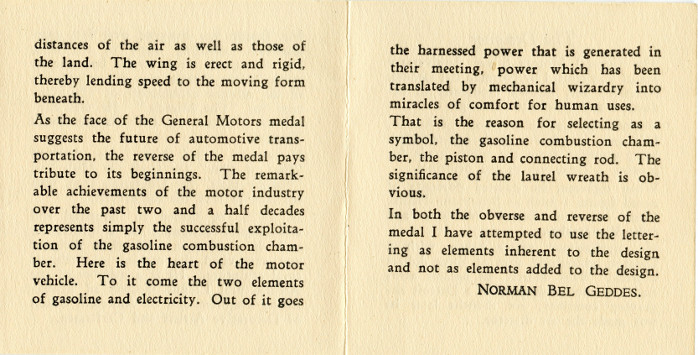
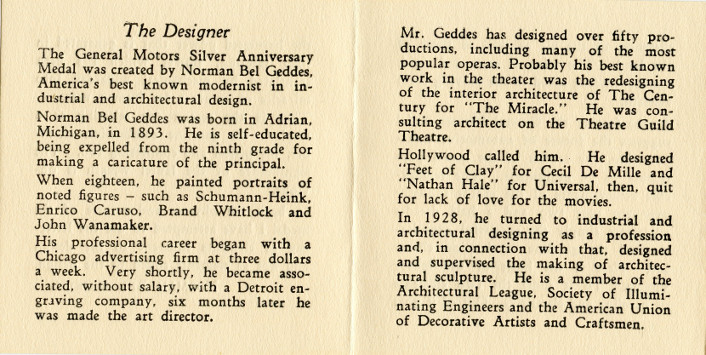
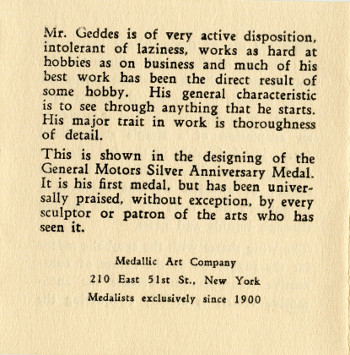
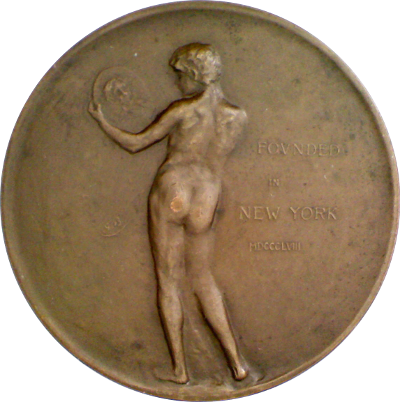
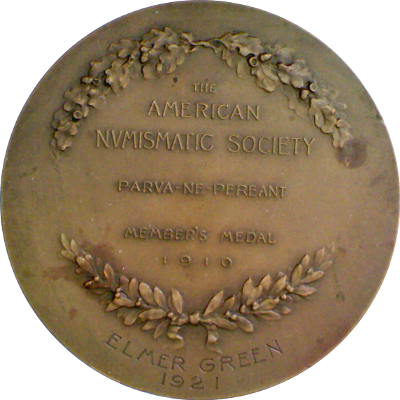
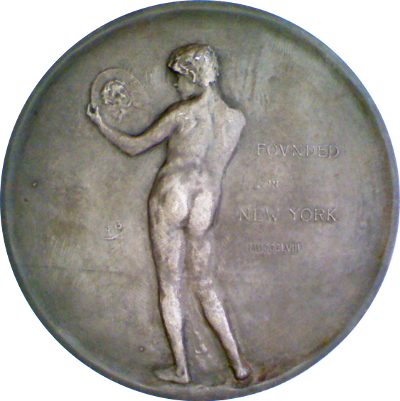
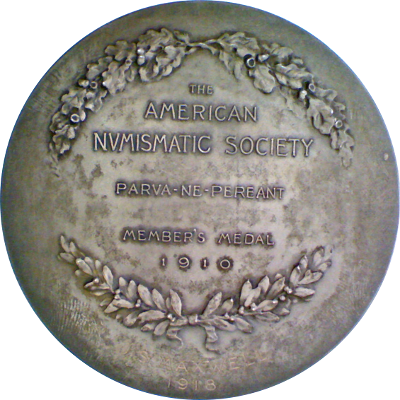
The obverse bears backside view of nude male figure looking at portrait plaque. On right, FOUNDED / IN / NEW YORK / MDCCCLVIII; signed on left (GB monogram);
The reverse bears wreaths above and below. In center, THE / AMERICAN /NUMISMATIC SOCIETY / PARVA NE PEREANT / MEMBER'S MEDAL / 1910; member's name engraved at bottom, ELMER GREEN / 1921.
This medal was first produced for the American Numismatic Society (ANS) by Tiffany & Co. and bore Tiffany&s edge mark. When the medals from this first run were exhausted, a second striking was ordered from the Medallic Art Company of New York and those medals usually bear its edge mark. There is at least one medal that does not have any edge marks, which is highly unusual.
The medal measures 77mm in diameter and was struck by Tiffany & Co. or the Medallic Art Company of New York.
References: Baxter 248, Marqusee 54






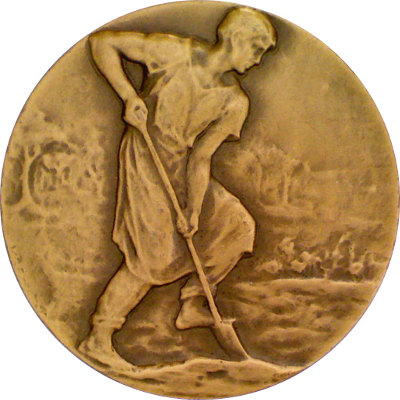
This uniface medal's obverse bears male figure in work clothes, digging in the earth with a spade, facing right.
According to Smedley, the medal might have been created as an ornament on a flower box, probably reduced from a painting.
The medal measures 76.1mm in diameter and was struck in bronze. The mintage is not reported.
References: MACo 1931-051, Marqusee 80, Smedley 112








This is the 12th medal issued by the American Numismatic Society.
The obverse bears winged angel of Mercy descending with arms extended over two seated figures in despair, female to the left representing poverty, male to the right representing crime. In exergue, ISSUED BY THE AMERICAN NUMISMATIC / AND ARCHAEOLOGICAL SOCIETY / NEW YORK; signed at lower right, V D BRENNER 98
The medal measures 77mm in diameter. The reported mintage for this medal is 1 piece in gold, 30 in silver, and 253 in bronze.
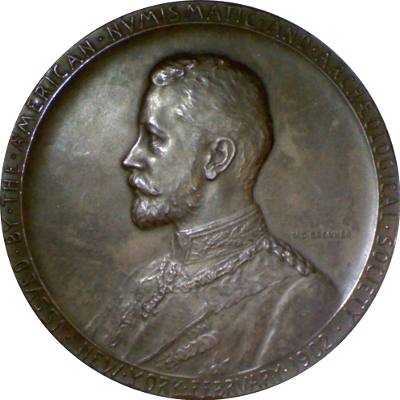
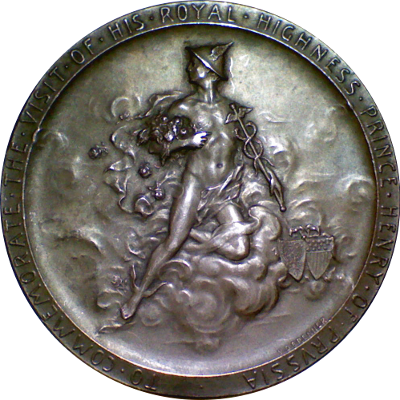
This medal is the 14th official issue of the American Numismatic Society.
The obverse bears bust of Prince Henry of Prussia, l. Around, ISSVED BY THE AMERICAN NVMISMATIC AND ARCHAEOLOGICAL SOCIETY / NEW YORK FEBRVARY 1902 ; signed over shoulder to right of bust, V.D.BRENNER
The reverse bears god Mercury riding on a cloud, bearing fruits, flowers and a caduceus; German and American flags to the right. Around, TO COMMEMORATE THE VISIT OF HIS ROYAL HIGHNESS PRINCE HENRY OF PRVSSIA; signed at 5:00, V.D.BRENNER
In 1902 Prince Henry of Prussia visited the United States to take delivery of a schooner yacht for his brother, Emperor Wilhelm II of Germany. The yacht was christened Meteor III by Alice Roosevelt on February 25, 1902.
While the idea for the medal came from the ANS' Edward Dean Adams, Victor David Brenner himself underwrote the issue, accepting all the risk with the exception of the material cost of the four pieces struck in gold. He graciously allowed the ANS to sell as many silver pieces as it could and retain all the profit thereof.
The circular medal measures 69mm in diameter. The mintage is reported as 4 pieces in gold, 301 in silver, 2 in copper and 1 in aluminum.
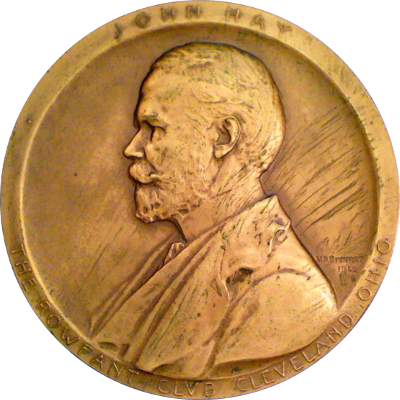
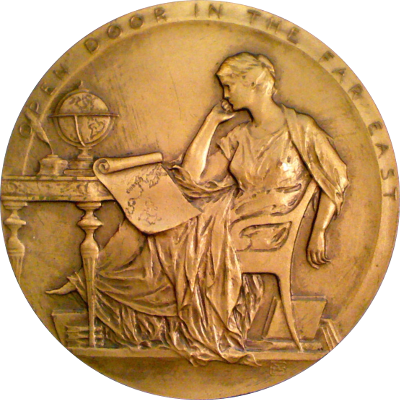
This medal's obverse bears bust of John Hay facing left. At top, JOHN HAY; along bottom, THE ROWFANT CLVB CLEVELAND OHIO; signed to right of shoulder, V.D.Brenner / 1912
The reverse bears seated female figure studying partially unrolled map of China coastline, globe with Pacific ocean and the Americas on desk, books strewn on floor. Around top, OPEN DOOR IN THE FAR EAST
The Rowfant Club was founded in 1892 by members who were "interested in primarily the critical study of books in their various capacities to please the mind of man." Membership was by invitation only.
John Hay was chosen as the subject of this medal because he was a famous diplomat and statesman and a native of Cleveland himself. He had been an honorary member of the Rowfant Club and had died in 1905 after a productive life in public service.
This medal was a gift of Ambrose Swasey, an industrialist and past President of the Rowfant Club of Cleveland, Ohio. Swasey engaged Brenner to create a medal for the Rowfant Club that would be handed to every member upon admission. Swasey obviously liked Brenner's work as he commissioned another medal a few years later to celebrate his company's 40th anniversary.
The medal measures 77mm in diameter and was struck in bronze. A mintage of 170 numbered pieces has been reported.
References: Marqusee 93, Smedley 94
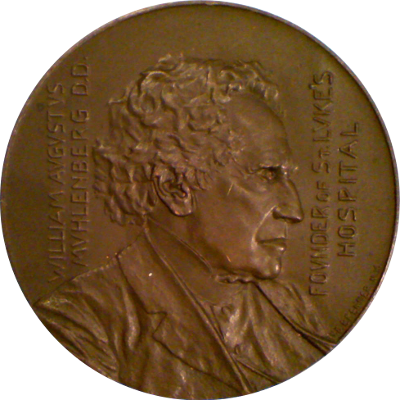
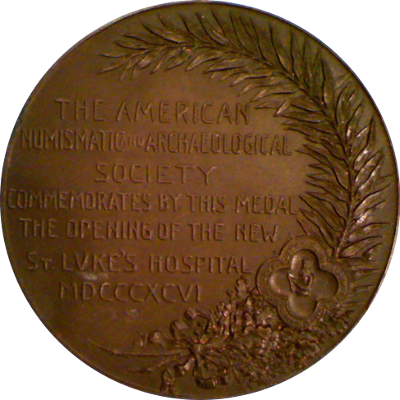
This is the 10th medal issued by the American Numismatic Society.
The obverse bears bust of Dr. Muhlenberg, right. To left, reading upwards, WILLIAM AVGVSTVS / MVHLENBERG D.D.; to right, reading upwards, FOVNDER OF ST. LVKE'S / HOSPITAL; signed along rim at lower right, V.D.BRENNER N.Y.
The reverse bears seal of hospital over branches of palm and oak to right. Seven-line inscription across center left, THE AMERICAN / NUMISMATIC AND ARCHAEOLOGICAL / SOCIETY / COMMEMORATES BY THIS MEDAL / THE OPENING OF THE NEW / ST. LVKE'S HOSPITAL / MDCCCXCVI
The medal commemorates the opening of the new St. Luke's Hospital building in New York City. St. Luke's Hospital was founded in 1858 by Dr. William Muhlenberg, an Episcopalian clergyman, as a private hospital. In 1896 it relocated from its original site at 5th Avenue and 54th Street to Amsterdam Avenue and 113th Street. In 1979 St. Luke's merged with Roosevelt Hospital.
Victor David Brenner cut the dies for this medal (his first for the ANS) by hand. The reported mintage for this medal is 1 piece in gold, 10 in silver, and 89 in bronze.